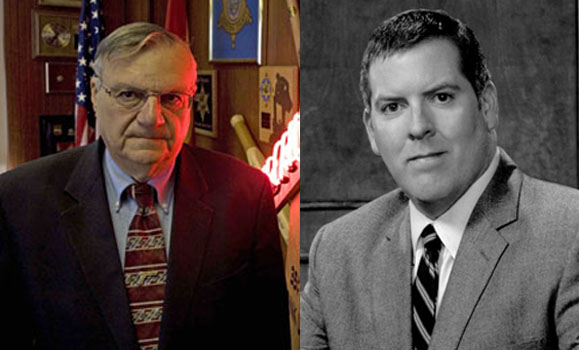Maricopa County Sheriff Joe Arpaio did not meet a Tuesday deadline to turn over documents to the Justice Department in their investigation into allegations that his immigration enforcement policies in Arizona are discriminatory.
Earlier this month, Assistant Attorney General for Civil Rights Thomas E. Perez sent a letter to Arpaio’s attorneys telling them that Arpaio had until Tuesday to voluntarily turn over documents. Perez wrote that if Arpaio did not cooperate, DOJ would file a civil action under Title VI of the Civil Rights Act of 1964 to compel access to the requested documents, facilities and personnel.
But DOJ isn’t filing suit just yet — and Robert Driscoll, one of Arpaio’s lawyers in the probe, told TPMMuckraker that he doesn’t think they will, at least not until they meet to discuss the probe next week. “I’m assuming they wouldn’t sue us until we sit down to meet,” Driscoll told us. Justice Department Spokeswoman Xochitl Hinojosa confirmed that a meeting at the request of the Maricopa County Sheriff’s Office was set for next week.
At issue for Driscoll is that, he says, the Justice Department’s request “is overly broad, but I think the reason that they’re doing it is most jurisdictions, frankly, kind of turn over what’s asked and don’t really question what DOJ’s authority for asking for it is.”
In fact, Driscoll thinks the entire document request is a fishing expedition. “Generally the way it should work is you have evidence that someone’s done something wrong, it’s not that you’re allowed to go fishing around and tell somebody what they did wrong after you look around for a year and a half,” Driscoll said.
“If they had a good-faith basis to believe there was a pattern and practice violation of constitutional rights, they could file suit,” Driscoll said. “It’s kind of the cart before the horse, because they’ve picked the person and they’ve picked the sheriff’s office, and they didn’t find a violation and so now they’re trying to, for the lack of a better term, gin up a violation.”
He also called the methodology of the Arpaio investigation unusual, citing the 1-800 phone number they set up to collect complaints about the sheriff’s office. “We didn’t do that when I was there,” said Driscoll, a former DOJ official during the Bush administration. “We didn’t say we’re doing a neutral review and then have a bilingual 1-800 number soliciting complaints against the department or office we were investigating.”
Driscoll said that the government will face an uphill battle to prove that the actions of Arpaio’s office were racially discriminatory, given that illegal immigrants had, by definition, committed a crime and that the majority of illegal immigrants in his jurisdiction were from Mexico. “Obviously violation rates don’t necessarily reflect the population,” Driscoll said. A analysis based only on the racial or national origin of those arrested wouldn’t work, he said, because “all immigration enforcement has a 100 percent disparate impact based on national origin, because 100 percent of the people born within the country aren’t in violation of immigration laws, and everyone who is in violation of immigration laws was born outside of the country,” Driscoll said.
Investigators with the Civil Rights Division of the Justice Department have been looking into allegations of racial profiling in connection with Arpaio’s enforcement of immigration laws since March 2009. Driscoll, now with the law firm of Alston + Bird, previously accused officials in the Justice and Homeland Security departments of political motivations in probes of Arpaio.
DOJ’s suit hasn’t stopped Arpaio from continuing his controversial practices – Driscoll said there’s “no question” that it’s business as usual in the sheriff’s office.
Driscoll said the government’s suit against the immigration law signed by Arizona Gov. Jan Brewer did not affect Arpaio’s operation either. “The Arizona law was irrelevant to what Sheriff Joe was doing, he was doing what he was doing before the Arizona law was a gleam in anyone’s eye really,” Driscoll said.
Driscoll said he also wasn’t worried about a new power that Congress recently granted DOJ in these types of investigations. The health care law signed by President Barack Obama in March contained a little-noticed provision that allows the Attorney General to expedite subpoenas from any institution that is the subject of a Civil Rights of Institutionalized Persons Act (CRIPA) investigation.
Although those potential CRIPA powers wouldn’t apply to investigations of discrimination during street-level arrests, DOJ could use such power in its investigation of conditions at county jail cells. The Justice Department disclosed that they were probing discrimination against Hispanic jail inmates in letters that DOJ sent to Arpaio, according to the Washington Post. One complaint to the Justice Department said that even those jail guards who are bilingual could only speak with inmates in English, which could endanger prisoners seeking medical care, said the Post. Hispanic visitors to the jail allegedly had to fill out a “citizenship check” forms, reported the newspaper.









